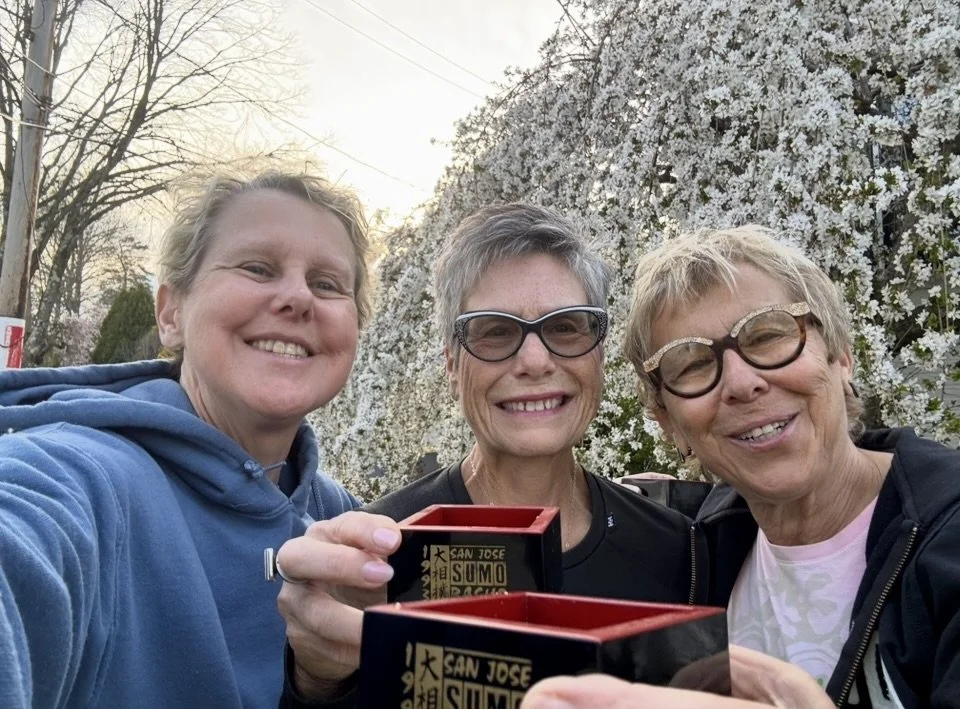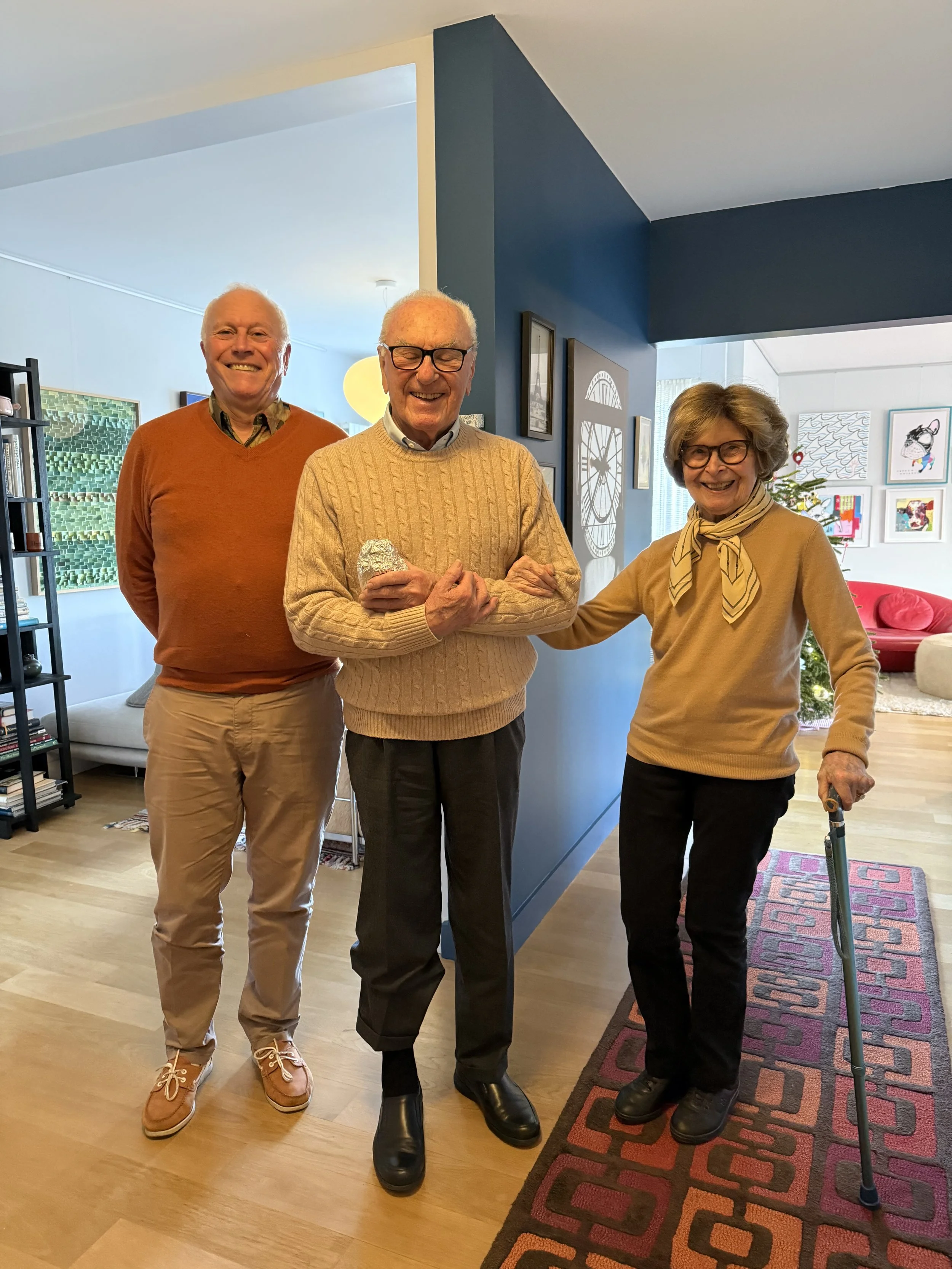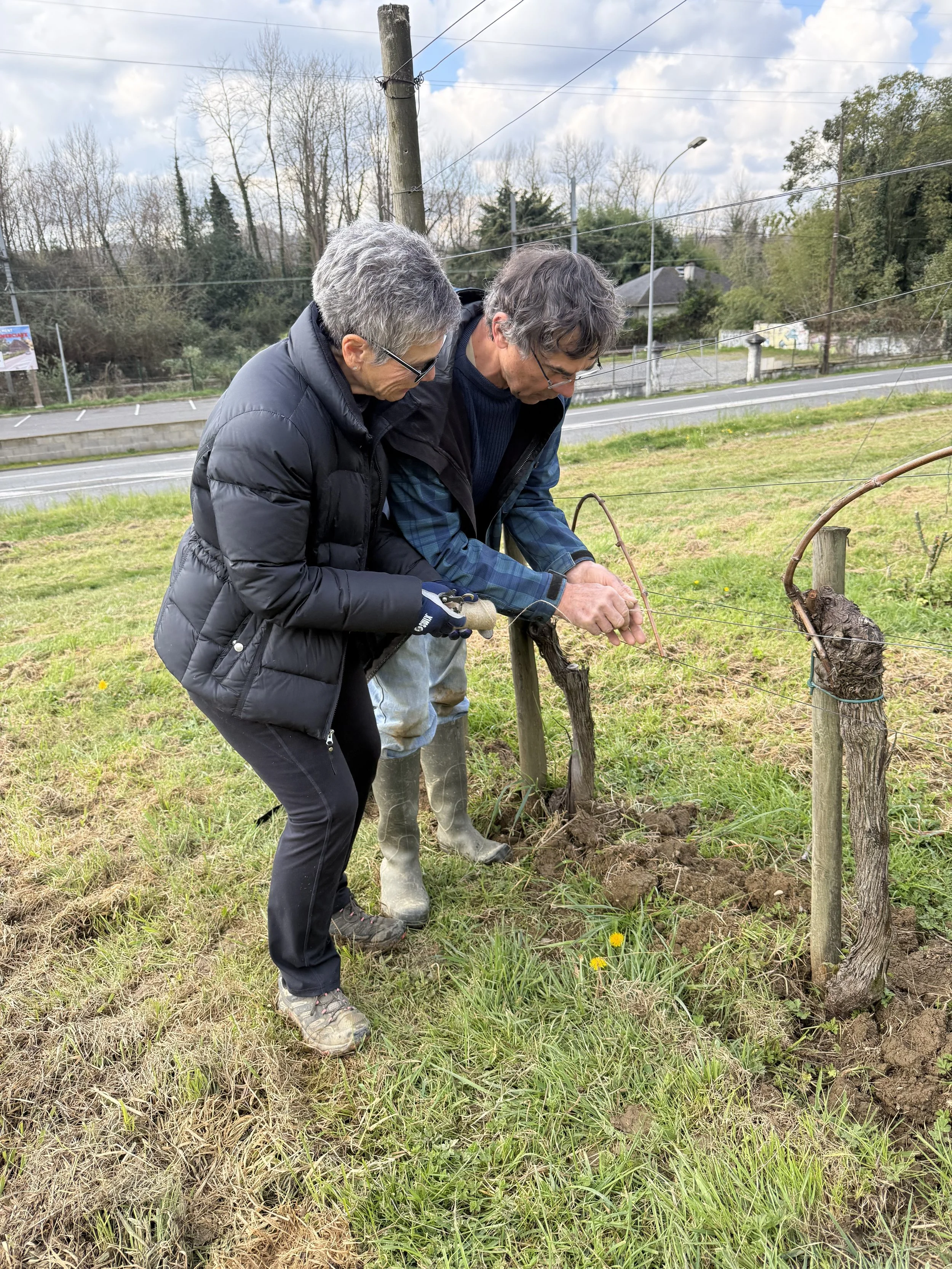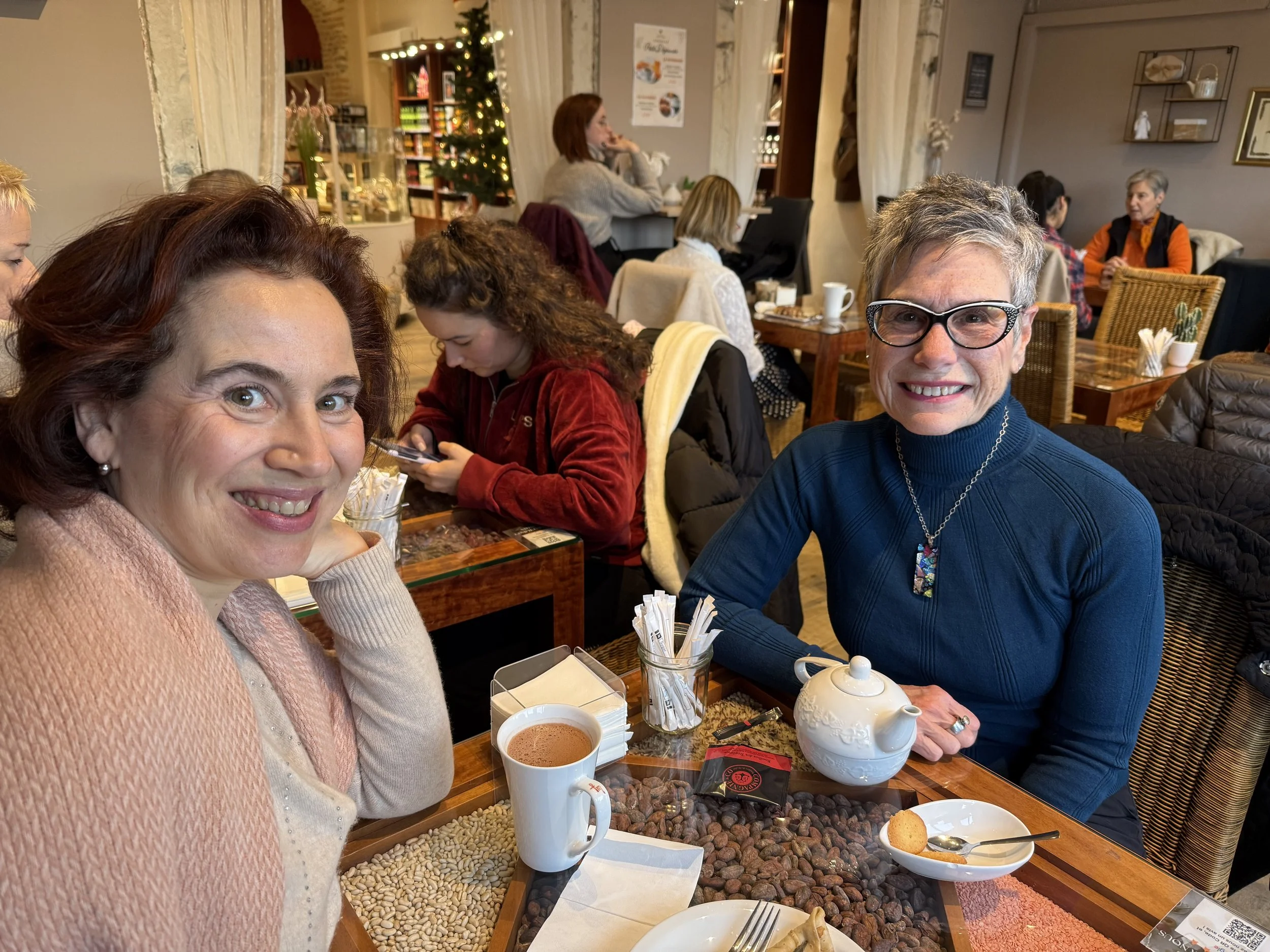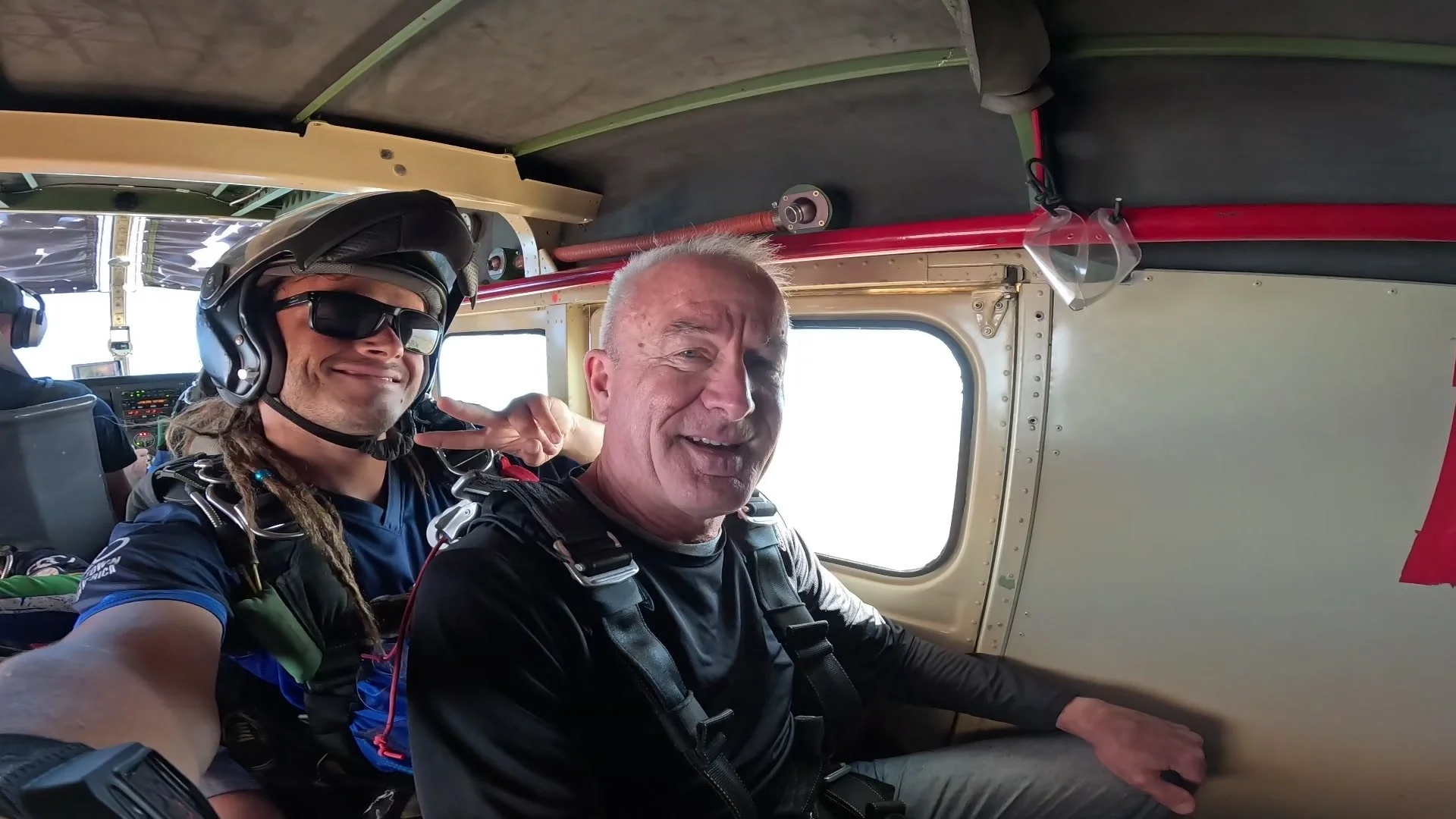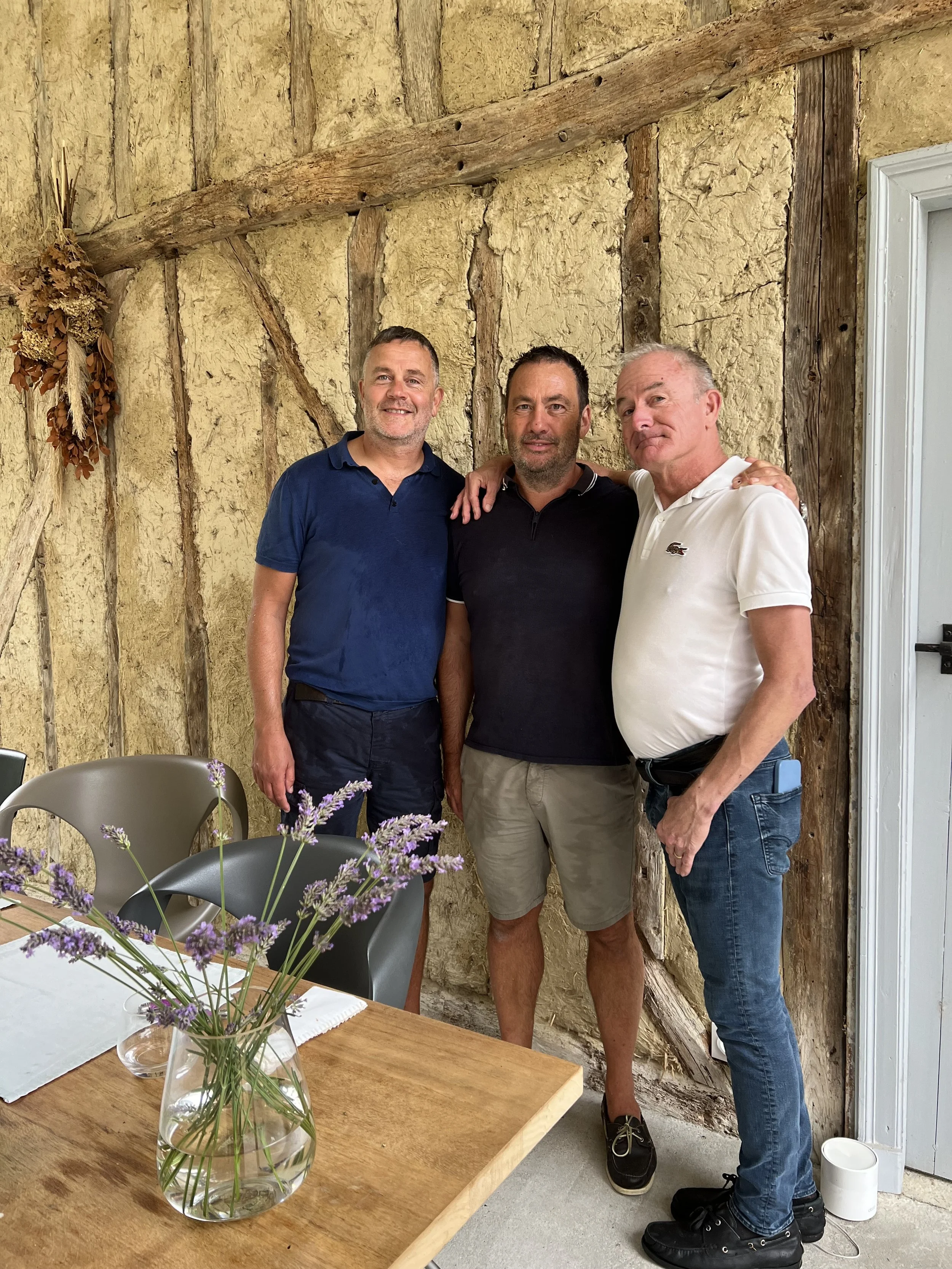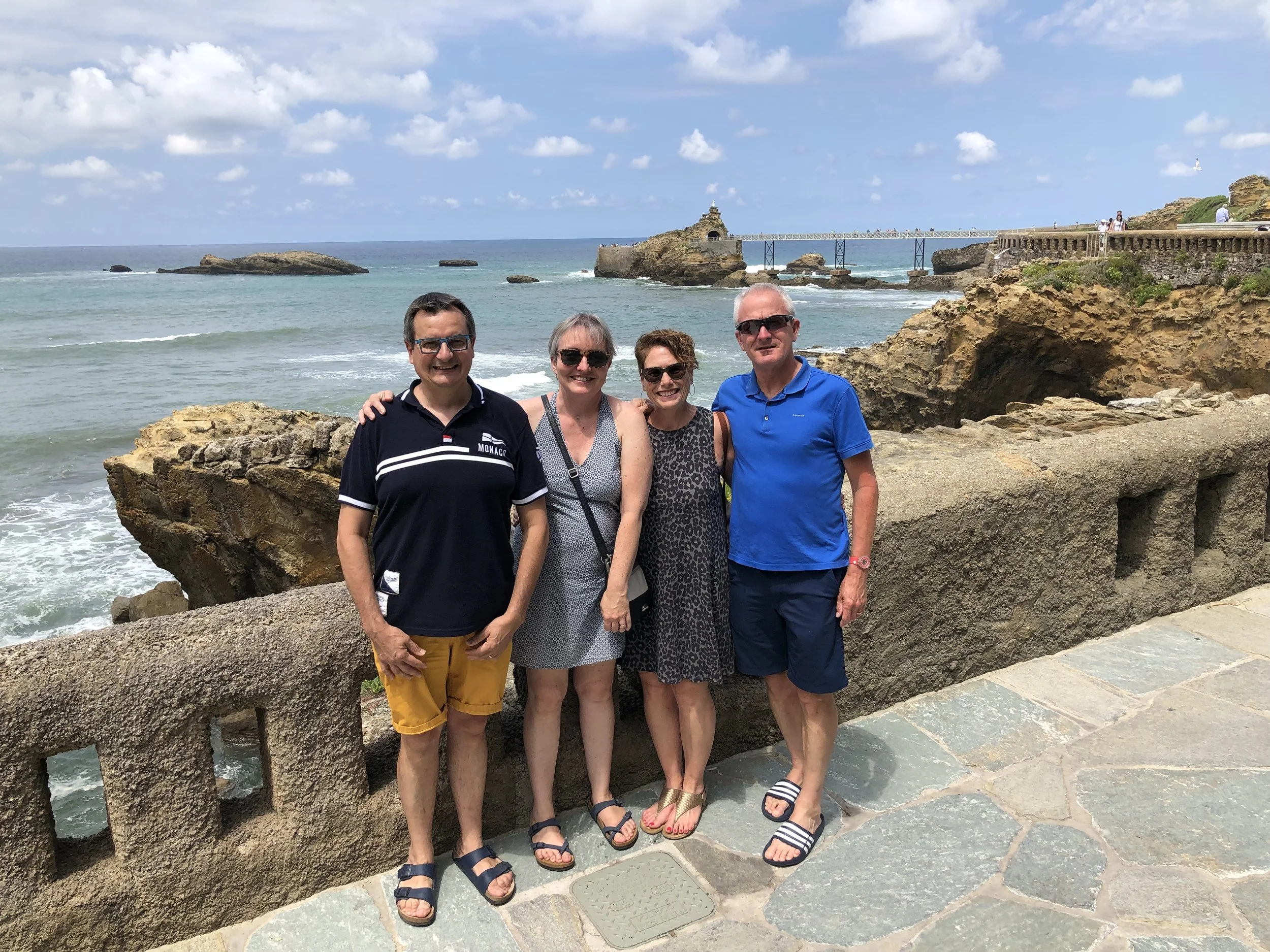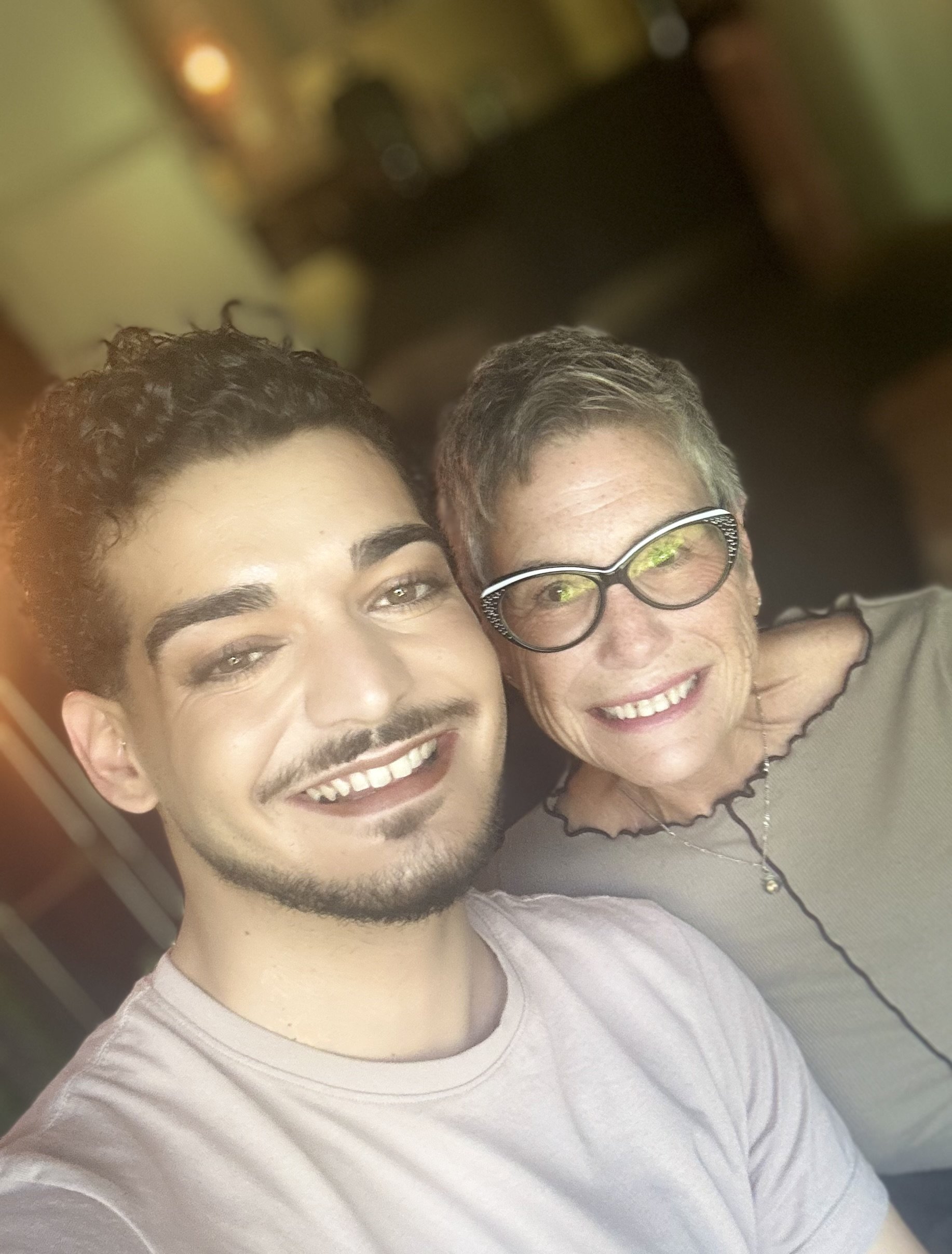A Friend is a Gift You Give Yourself
Boston hosts Trica and Jane, toasting the Spring cherry blossoms with me at their lovely home.
“ A friend is a gift you give yourself.” Robert Louis Stevenson
The Scottish poet, novelist, essayist, and travel writer who penned this axiom confessed that he valued making friends over academic success during his university studies. His admission is understandable, considering he spent much time alone in bed as a child due to what became a lifelong battle with chronic bronchial disease. His early friendships were conjured in seclusion through imagination: a golden gift to the writer, but an unfortunate deprivation for a child.
For different reasons, my early report cards often concluded with teachers’ cautionary comments regarding my similar preference for camaraderie over academics. Perhaps the social disruption of two relocations by the time I turned six, and my inherited love of storytelling, contributed to my focus on people rather than subject matter. Although I never perfected a balance of these competing interests, the resulting communication and relationship-building skills proved invaluable along the twists and turns of my professional and personal life.
With those years now fading in the rearview mirror, it is the people picked up along the way – not the accomplishments – that remain most treasured. The importance of these relationships has been magnified by moving to a new country. A lifetime of building friendships, some enduring and others not, couldn’t prepare me for leaving the safety net of family and friends, nor the difficulty of fabricating a new one in a foreign language and culture. My recent return to France after several weeks of reconnecting with US ties has me thinking about the importance of friendships and how difficult it is to make and keep them as we age, with or without a continental shift.
“Friendship improves happiness and abates misery, by the doubling of our joy and the dividing of our grief.” Marcus Tullius Cicero
How important are friendships and a solid social network as we age? (1) Research indicates that a committed romantic relationship or a strong social network can increase life expectancy by as much as 44 - 49 percent. Adults who engage with a broad social circle, beyond immediate family and close friends, are more likely to have higher levels of physical activity, greater positive moods, and fewer negative feelings. (2) Conversely, the lack of a social network has been linked to dementia, depression, and physical health problems. (3)
Unfortunately, as we age, we encounter unique challenges in forming friendships and expanding our social circle. Some familiar avenues, like school and work, no longer exist. This is further complicated by a tendency to become more set in our ways and less open to new experiences (4). Statistics also indicate that seniors are more selective about choosing new relationships and less trusting of others--the unfortunate fallout from past conflicts and failed relationships. And finally, seniors exhibit a developmental tendency toward pruning social networks: cutting off relationships that no longer provide a deeply emotional or meaningful connection. (5) In light of these challenges, it is not surprising that more couples are divorcing after the age of 50 than ever before. (6)
Living in a foreign country and culture further complicates this period of transition, especially for someone not fluent in the language of their adopted country. Like many other expats, I initially found that the inability to readily recount my personal history or express what I value, believe, and love made forming new friendships almost impossible. While I am thankful to have a spouse with whom I face these challenges, it places an enormous burden on a partner to be the sole advisor, confidant, cheerleader, and comforter while they are feeling equally vulnerable. The combined pressures of age-related and cultural change brought JB and me to an unexpected crisis point as individuals and as a couple. Moving forward required self-examination, reevaluation, and counseling. Rebuilding a sense of ease and security in this phase of life is an ongoing process.
“I have learned that to be with those I like is enough.” Walt Whitman
Fortunately, there are remedies for resisting the socially isolating tendencies of aging. The first “fix” is to alter the expectation of what a friendship must provide. According to Marissa G. Franco, PhD in Psychology, “friendship isn’t about closeness at all costs. It’s about finding the distance at which we feel closest to one another—the optimal level of intimacy.” (7) In other words, no one person, partner, or friend can fulfill all our intimacy needs. Franco proposes that “the more we customize our relationships, the greater our well-being.” For example, one friend might be great as a travel companion, another for attending cultural events, and another to bellyache with about family, politics, or the state of the planet. She also suggests that some friendships thrive better in small doses. One may not need these “low-dose friends” daily, but they can offer the occasional shot in the arm of humor, advice, or commiseration we all need now and then.
Another important remedy is to develop new strategies for forming relationships. Meg Selig, a blogger for Psychology Today, offers 12 practical steps to help seniors build a social network that are worth reading. (8) She advises that the first and most fundamental step is “to make the decision that friendship is important to you.” For a naturally social creature like me, this was a “no-brainer,” but it has been a new challenge and shift in priority for JB, who has always been a loner and more comfortable with individual pursuits. But much like the AA principle of “admitting you need help,” acknowledging the need for friends is essential to finding them.
Once this admission is made, Selig prescribes injecting another dose of reality: “realize that making friends requires a deliberate effort.” This is followed by some practical suggestions that we have found particularly helpful: “promote” acquaintances, neighbors, and former colleagues to friend status, and “be bold and invite yourself into new social groups, especially those that meet regularly.”
The “promotion” of neighbors to friends evolved naturally for us in Pau. JB and I were fortunate to have several neighbors in our apartment building befriend us even before we lived in France full-time. By reciprocating invitations to socialize and opening our hearts and homes to each other, these neighbors have gradually become our most important relationships in this new life. They help anchor our sense of safety and belonging here.
Neighbors Jean-Claude, Jacques, and Michelle
“My friends are my estate.” Emily Dickinson
This principle of deepening relationships has worked “stateside” as well. My increased social media presence, aimed at advancing this blog, has renewed contact and offered friendship opportunities with acquaintances, colleagues, and even family with whom I had lost touch. By following the trail of social media crumbs to my website, a cousin I had not seen in over 30 years recently reached out to me. She shared her joy in reading the blog, especially the stories about our grandmother and my dad. Several emails later, we arranged to meet at her sister Eileen’s Boston-area home during my visit this past September. In true Italian family style, we spent hours filling in the gaps over an amazing spread of food that they had generously prepared. There were no recriminations over moments missed, just gratitude for the door opened to renewed friendship. I’m so grateful for their effort to reconnect and am looking forward to an expanded family reunion on my next trip to Boston.
JB and I have also proved that Selig's recommendation for “making bold moves” pays dividends. Even when we knew very little French and were only in Pau part-time, we doggedly attended our building’s condo meetings. Despite an awkward lack of verbal participation, our presence demonstrated that we weren’t just a novelty, “les Américains,” but rather concerned members of their community. It also laid the foundation for relationships as our language skills improved. More recently, we joined a local group that maintains a community vineyard. The other volunteers have expressed their surprise and appreciation for our willingness to help protect an important part of their local history and culture. Our vineyard mentor, Clement, also a recent retiree, is destined for our inner circle of friendships. We have also met several international couples through a local expat website and through our intensive language courses at the University of Pau.
Not all our “bold moves” have been taken as a couple. About a year ago, I responded to a message posted at the University of Pau by a local writer seeking another woman with whom she could converse in English and French. Our weekly “rendezvous” has evolved into companionship that includes going to the cinema, cultural events, or enjoying lunch at a favorite bistro. JB is content taking a more circuitous path to new relationships. He recently dove into skydiving (forgive the pun). Pursuit of a Class A license will allow him to jump solo anywhere in the world and to join our local Pau Parachuting Club. Ideally, this will open the door to new French friends. To post his progress in the sport, JB finally joined social media after years of resistance. It has connected him with other enthusiasts and reopened contact with relatives in the US, Canada, and Scotland.
Valiant efforts aside, opportunity sometimes arrives unexpectedly, as it did when a chance encounter on a flight from Amsterdam to Toulouse turned into a lasting friendship with a Dutch man, Joop, and his French husband, Alain, whose country home is an hour away from Pau. We all savor alternating city versus country lunches that always offer great conversation and “digestive” strolls. But this was not the only “fateful” friendship. The very first lifeline thrown to us in Pau was American-born Christi, the translator assigned to us at our real estate closing. She navigated us through that voyage and across many other rough seas since. Christi and her French husband, Jean-Pierre, who live near Biarritz on the Atlantic coast, are now dear friends we visit regularly to slurp oysters, try new bistros, or even travel with to San Sebastian, Spain, for tapas. And what would I do without my amazing “coiffeur” (hair stylist) Tomei? After randomly choosing him at a “funky” salon, his warmth and willingness to speak “Franglais” with me have grown into a cherished friendship. Now working on his own, each session begins with a lengthy conversation over espresso. More than three decades my junior, Tomei keeps me up to date on popular music and offers a wise but youthful perspective I value deeply.
“Friendship is love without its wings.” Lord Byron
While I welcome all these opportunities to expand our social networks, the effort to nurture both new and old connections on two continents can be complicated. At home in Pau, there are time zone differences, technical glitches during video calls, and simple procrastination to overcome.
In Boston, complicated logistics and emotional exhaustion take their toll. Organizing dates with friends and family constantly competes with my top priority of visiting my 98-year-old mother. The result is an emotional rollercoaster ride that swings back and forth between the stark reality of Mom’s memory care facility and joyful chatter with friends about my “charmed life” abroad. While caught in the infinite loop of whiplash, it’s easy to get stuck on repeat—sometimes forgetting to pause, listen, and truly connect with someone. While that neglect may hinder newer relationships, the old ones always manage to pick up right where they left off. Somehow, longtime friends uncannily read between the lines and hear what wasn’t spoken. I am deeply grateful for their support, especially the women who shelter me during these complicated visits and those who rearrange their schedules at a moment’s notice to fit mine.
“Each friend represents a world in us, a world not born until they arrive, and it is only by this meeting that a new world is born.” Anais Nin
Although the experts offer useful advice and techniques, I don’t believe that human connection can always be prescribed or perfectly coordinated. With each passing year, our personal history deepens and expands. Relationships with a long arc have the advantage of witnessing paths taken and milestones reached. They have a context for future shared events and experiences. When a new person is brought into our world, we may feel it is necessary to fill in the historical vacuum; to put a framework around who we are.
Yet, how much of that personal history, and in my case, former culture as well, is essential for the foundation of a new relationship? Maybe relinquishing the archaeology of our past offers a rare freedom. I love Anais Nin’s vision of friendship as the birth of a new world. She invites us to tap into an undiscovered self and find “a world not born” until the new friend arrives. It takes courage to let go of well-honed definitions, comfort zones, and expectations; to let friendship deliver a new world. Yet what a hopeful and promising way to embrace the years ahead here in France or wherever else life may lead.
Notes:
(1) Zaraska, Marta. Growing Young: How Friendship, Optimism, and Kindness Can Help You Live to 100. Penguin Random House Canada, 2020
(2) Sae Hwang Han, Kyungmin Kim, Jeffrey A Burr. Friendship and Depression Among Couples in Later Life: The Moderating Effects of Marital Quality. The Journals of Gerontology: Series B, Volume 74, Issue 2, February 2019, Pages 222-231, https://doi.org/10.1093/geronb/gbx046
(3) Guarnera, Jade, Yuen, Eva, Macpherson, Helen. The impact of Loneliness and Social Isolation on Cognitive Aging: A Narrative Review. Journal of Alzheimer’s Disease Reports. https://doi.org/10.3233/ADR-230011
(4) Gillis, Kaytee. Why Does Making Friends Get Harder as We Age? Psychology Today. June 7, 2024. https://www.psychologytoday.com/us/blog/invisible-bruises/202406/why-does-making-friends-get-harder-as-we-age
(5) Gillis, ibid.
(6) Jason, Sharon. Divorce Skyrocketing Among Aging Boomers. AARP. September 6, 2023. https://www.aarp.org/family-relationships/gray-divorce-trend/
(7) Franco, Marissa G. Why Distance Can Create Intimacy in a Friendship. Psychology Today. August 6, 2025. https://www.psychologytoday.com/us/blog/platonic-love/202507/why-distance-can-create-intimacy-in-a-friendship
(8) Selig, Meg. 12 Ways to Make Friends Mid-life and Beyond. Psychology Today. November 7, 2022. https://www.psychologytoday.com/us/blog/changepower/202211/12-ways-make-friends-in-mid-life-and-beyond

